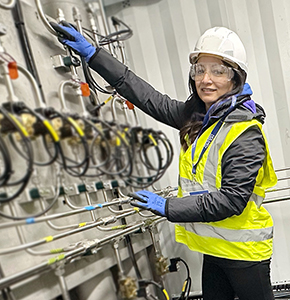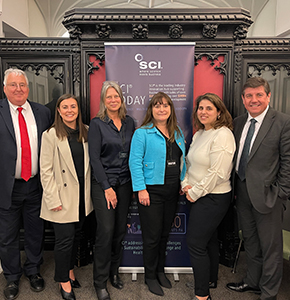In an article in UK Science and Technology Review, 'We've got chemistry,' SCI Executive Director Joanne Lyall 2010-13 heralds strengthening connections between science and business to secure competitive economic growth:
Chemistry is critical to every part of the UK's value supply chain, but it is often an unknown ingredient. It has a vital role to play in achieving sustainable economic growth through rebalancing the UK's dependence on services by rebuilding our traditional strength in manufacturing. A wide range of sectors depend on chemistry to remain internationally competitive, including aerospace, electronics, automotive, healthcare and personal care, and food and agriculture.
It is not well known that the chemistry-using industries are a bigger contributor to the UK's Gross Value Added than other major sectors, such as aerospace or car manufacturing. The chemistry-using industries directly and indirectly employ more than six million people in the UK, and the sector's labour productivity is more than double the country's average. These industries are consistently innovative, highly entrepreneurial and attract substantial international investment into the UK.
The benefits to society of the practical applications of chemistry are overwhelming, and our current quality of life would be much poorer without them. However, chemistry remains surprisingly misunderstood by the general public, who tend to associate chemicals with pollution and risk, rather than appreciating them for the benefits they offer. This poses a challenge to the industry, as well as to the organisations that promote the use of chemistry, to continue to find new ways to explain the positive story of what chemistry already does for us now, and how it can be harnessed to improve our future.
There have been enormous advances in the pharmaceuticals field. Our ability to understand the human genome is enabling us to tackle diseases that not long ago were considered incurable. Indeed, we now look forward to the advent of personalised medicine. Moreover, major leaps in agricultural productivity have been made through selective breeding, improved animal nutrition and health, and enhanced fertilisers and pesticides. We are also continuing to improve our understanding of genetics in order to make further advances towards the goal of feeding the burgeoning world population.
Chemistry-based technologies, such as biorenewables and hydrogen fuel cells, are helping to tackle the need for sustainable energy solutions. Chemistry is enabling new techniques for reducing, recycling and reusing other valuable resources, in order to ensure that our way of life can be sustained and enhanced. Rare earths and metals, which are so vital to hi-tech industries such as electronics, are a commonly quoted example, but there are many other critical components to industrial growth that are in short supply. Chemistry can help us to find sustainable alternatives by using new combinations of chemical compounds to generate materials with extraordinary properties - graphene is just one example.
Collaboration between science and industry is important in ensuring that the benefits of research are translated into practical advances in industrial products and processes. Organisations such as SCI are integral to connecting scientists and business people through activities, conferences, and publications in person and online. The germ of a great idea often arises from a serendipitous encounter between people from different backgrounds or from accessing new information. This is the advantage of multidisciplinary networks that bring together chemists and other scientists with chemical engineers and people from all aspects of the chemistry-using industries, including senior management, R&D, finance, marketing, and health and safety.
The benefits to society of the practical applications of chemistry are overwhelming, and our current quality of life would be much poorer without them.
Constrained travel budgets and the reduction in headcount in recent years has reduced the willingness of some companies, large and small, to allow their employees time to access such open innovation opportunities. Yet it is exactly this type of collaboration that can help to accelerate the growth of existing businesses and encourage the formation of new ones. This has also affected government employees, who could benefit from more regular interaction with industry and academia. While in theory we can access all the information we need via our computer (or, increasingly, our handheld devices), this is no substitute for the creative stimulation and the trust derived from face-to-face discussions, and we continue to need both forms of interaction.
As well as encouraging people from academia and industry to collaborate, key organisations within the sector also work together. SCI, for example, collaborates with the Royal Society of Chemistry, the Chemistry Innovation Knowledge Transfer Network, the Chemical Industries Association and the Institution of Chemical Engineers to create larger networks, as well as to increase opportunities and also raise awareness of the importance of chemistry and the chemistry-using industries to the economy and society as a whole.
Chemistry is essential to achieving sustainable growth and enhancing quality of life, and has proven over centuries to be a good return on investment. It therefore makes sense for the government and the private sector to continue to invest not only in research funding, but also in the physical and skills infrastructures to support companies to translate that knowledge into practical innovative products and processes that ensure that the UK can compete globally in terms of international trade, inward investment and overall economic performance.
- This article appears in UK Science and Technology Review, Issue 7, 2012.
Joanne Lyall
Executive Director 2010-13, SCI
For more information, contact: SCI Marketing, T: +44 (0)20 7598 1579, F: +44 (0)20 7598 1545, E: scimarketing@soci.org.
About SCI
SCI is an inclusive, multi-disciplinary forum connecting scientists and business people to advance the commercial application of chemistry and related sciences for public benefit. SCI is a unique international forum which anyone can join to share and exchange information, ideas, innovations and research. Members can access our growing network of member specialists from sectors as diverse as food and bio-renewables, water, waste and environment, energy, materials and manufacturing and health and well-being. The Society, in partnership with Wiley-Blackwell, publishes a portfolio of high quality scientific journals and books that attract contributions from scientists worldwide. Originally established in 1881, SCI is a registered charity with members in over 90 countries. For more information on our activities and publications, please visit our About us page.








